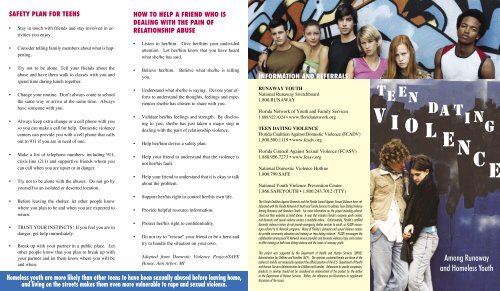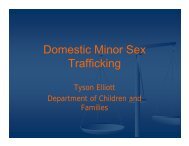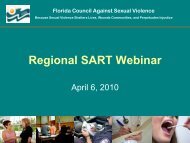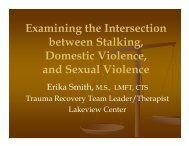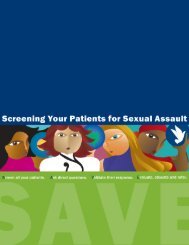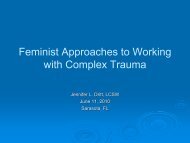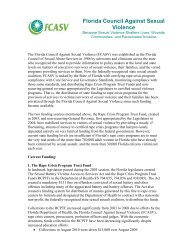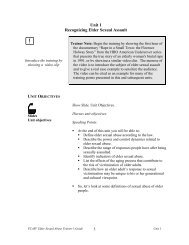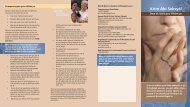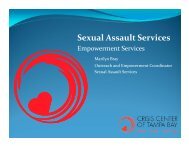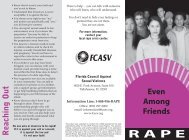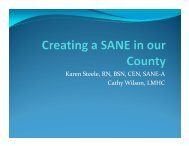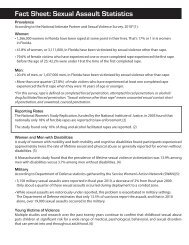teen violence brochure.indd - Florida Council Against Sexual Violence
teen violence brochure.indd - Florida Council Against Sexual Violence
teen violence brochure.indd - Florida Council Against Sexual Violence
Create successful ePaper yourself
Turn your PDF publications into a flip-book with our unique Google optimized e-Paper software.
SAFETY PLAN FOR TEENS• Stay in touch with friends and stay involved in activitiesyou enjoy.• Consider telling family members about what is happening.HOW TO HELP A FRIEND WHO ISDEALING WITH THE PAIN OFRELATIONSHIP ABUSE• Listen to her/him. Give her/him your undividedattention. Let her/him know that you have heardwhat she/he has said.• Try not to be alone. Tell your friends about theabuse and have them walk to classes with you andspend time during lunch together.• Change your routine. Don’t always come to schoolthe same way or arrive at the same time. Alwayshave someone with you.• Always keep extra change or a cell phone with youso you can make a call for help. Domestic <strong>violence</strong>centers can provide you with a cell phone that callsout to 911 if you are in need of one.• Make a list of telephone numbers: including 911,crisis line (211) and supportive friends whom youcan call when you are upset or in danger.• Try not to be alone with the abuser. Do not go byyourself to an isolated or deserted location.• Before leaving the shelter, let other people knowwhere you plan to be and when you are expected toreturn.• TRUST YOUR INSTINCTS! If you feel you are indanger, get help immediately.• Break up with your partner in a public place. Letother people know that you plan to break up withyour partner and let them know where you will beand when.• Believe her/him. Believe what she/he is tellingyou.• Understand what she/he is saying. Devote your effortsto understand the thoughts, feelings and experiencesshe/he has chosen to share with you.• Validate her/his feelings and strength. By disclosingto you, she/he has just taken a major step indealing with the pain of relationship <strong>violence</strong>.• Help her/him devise a safety plan.• Help your friend to understand that the <strong>violence</strong> isnot her/his fault.• Help your friend to understand that it is okay to talkabout the problem.• Support her/his right to control her/his own life.• Provide helpful resource information.• Protect her/his right to confidentiality.• Do not try to “rescue” your friend or be a hero andtry to handle the situation on your own.Adopted from Domestic <strong>Violence</strong> Project/SAFEHouse, Ann Arbor, MIHomeless youth are more likely than other <strong>teen</strong>s to have been sexually abused before leaving home,and living on the streets makes them even more vulnerable to rape and sexual <strong>violence</strong>.INFORMATION AND REFERRALSRUNAWAY YOUTHNational Runaway Switchboard1.800.RUNAWAY<strong>Florida</strong> Network of Youth and Family Services1.888.922.4324 • www.floridanetwork.orgTEEN DATING VIOLENCE<strong>Florida</strong> Coalition <strong>Against</strong> Domestic <strong>Violence</strong> (FCADV)1.800.500.1119 • www.fcadv.org<strong>Florida</strong> <strong>Council</strong> <strong>Against</strong> <strong>Sexual</strong> <strong>Violence</strong> (FCASV)1.888.956.7273 • www.fcasv.orgNational Domestic <strong>Violence</strong> Hotline1.800.799.SAFENational Youth <strong>Violence</strong> Prevention Center1.866.SAFEYOUTH • 1.800.243.7012 (TTY)The <strong>Florida</strong> Coalition <strong>Against</strong> Domestic and the <strong>Florida</strong> <strong>Council</strong> <strong>Against</strong> <strong>Sexual</strong> <strong>Violence</strong> have collaboratedwith the <strong>Florida</strong> Network of Youth and Family Services to address Teen Dating <strong>Violence</strong>Among Runaway and Homeless Youth. For more information on the project including referralscheck out their websites as listed above. A map that includes <strong>Florida</strong>’s runaway youth centersand domestic and sexual <strong>violence</strong> centers is available online.. Unfortunately, <strong>Florida</strong>’s certifieddomestic <strong>violence</strong> centers do not provide emergency shelter services to youth, so FCADV encouragesreferral to FL Network programs. Many of <strong>Florida</strong>’s domestic and sexual <strong>violence</strong> centersdo provide community education and training on <strong>teen</strong> dating <strong>violence</strong>. FCADV encourages thecollaboration among local FL Network service providers and domestic <strong>violence</strong>/rape crisis centersto offer training on both <strong>teen</strong> dating <strong>violence</strong> and the issues of runaway youth.This project was supported by the Department of Health and Human Services (DHHS)Administration for Children and Families (ACF). The opinions contained herein are those of theauthor(s) and do not necessarily represent the official position of the U.S. Department of Healthand Human Services Administration for Children and Families. References to specific companies,products, or services should not be considered an endorsement of the product by the authoror the Department of Human Services. Rather, the references are illustrations to supplementdiscussion of the issues.T E E N D A T I N GV I O L ENCEAmong Runawayand Homeless Youth
DEFINITIONSRunaway Youth - The term “runaway youth” typicallyrefers to children between the ages of 10 – 17 who haverunaway from their family or home or who are homeless.Dating <strong>Violence</strong> - “Dating <strong>violence</strong>” is any intentionalsexual, physical or psychological attack on one partnerby the other in a dating relationship. This definition reflectsthe belief that all forms of abuse are harmful andneed to be taken seriously.Who is affected by dating <strong>violence</strong>?Like homelessness or running away, dating <strong>violence</strong> canaffect anyone. Victims and abusers come from all socialand economic backgrounds,faith communities,and racialand ethnic groups.Dating <strong>violence</strong> alsooccurs in same-sexrelationships.WARNING SIGNS• Teens generally do not tell others when they are involvedin a violent relationship• A <strong>teen</strong> may believe that reporting a problem wouldget them into more trouble.• Most often, if a <strong>teen</strong> chooses to tell anyone, that personwill be their friend and peer.• Unexplained bruises, scratches, or injuries• Fear of partner• Controlling behavior• Making all the decisions• Checking up on partner’s whereabouts• Accounting for partner’s time• Extreme jealousy and possessiveness of partner• Lash out, criticize, or insult partner• Minimization of <strong>violence</strong> or abuse• Loss of interest in things that were once important• Sudden change in appearance of behavior• Spending less time with friends and family• Sudden changes in mood or personality (anxious ordepressed, acting out, or being secretive)• Begin using drugs or alcoholMost youth in runaway shelters have left homebecause of a difficult family situation.CHARACTERISTICS OF TEEN DATINGVIOLENCETaken from FCADV’s Teen Dating <strong>Violence</strong> Among Runawayand Homeless Youth Power and Control WheelPEER PRESSURE: Pressuring partner to steal for her/him to prove his/her love. Telling lies about partner toothers living on the street or in shelter.ISOLATION/EXCLUSION: Telling partner that everyoneelse on the street is out to get her/him and not to talkto anyone else without permission. If she/he does, she/hewill “pay for it”. Using jealousy to justify actions.SEXUAL COERCION: Telling partner he will break upwith her and not protect her from others on the street if shedoes not have sex with him.THREATS: Telling partner that if she doesn’t do whathe says, he will leave her and turn her over to the streetswhere others will take advantage of her.MINIMIZE/DENY/BLAME: When partner complainsabout life on the street he/she convinces her/him to shutup. He/she says she/he is at fault for choosing to runawayand that no one is stopping her/him from going home.INTIMIDATION: Partner doesn’t like how she/he is behaving,so he/she dumps their food and belongings in thedumpster saying the “next time it will be her/him.”USING SOCIAL STATUS: Making her panhandle.Telling her she owes it to him and if she won’t do whathe says she can leave because there are plenty of girls thatwant to be with him.ANGER/EMOTIONAL ABUSE: Telling partner she/he is fat, ugly and lucky that she/he is with them becauseno one else would.The following is from National Youth <strong>Violence</strong> PreventionResource Center and is titled, Teen Dating <strong>Violence</strong>found at http://www.safeyouth.org.What You Can Do1 Know the warning signs that you’re in a datingsituation or relationship that could have the potential tobecome violent. If you’re in a dating relationship thatin any way feels uncomfortable, awkward, tense or evenfrightening, trust your feelings and get out of it. It couldbecome, or may already be, abusive. Always remember:You have every right to say no.2If you are in a violent, or potentially violent relationship,realize that the <strong>violence</strong> will not just stop or goaway. You cannot change your boyfriend or girlfriend’sbehavior by changing your behavior, nor are you inany way responsible for the abuse. Your boyfriend orgirlfriend may need counseling or other outside help tochange and you may need support so that you can beginto heal.3Dating <strong>violence</strong> is about power and control.Be on the lookout forfriends that may be in violent datingsituations or relationships.4Take action if you suspectthat someone you know is beingabusive. If you feel you are notin danger, talk to the person abouthis or her use of <strong>violence</strong>, andmake sure that the person understandsthat it is both wrong andillegal. If the person is ready tomake a change, help him or her toget help.5If you are hurting someone else, have the courageto get help!No matter what the other person does to provokeyou, no matter how justified you feel, no matter whatyour friends do, it is never okay to harm someone else.Remember that physical and sexual <strong>violence</strong> are illegaland can land you in jail.You can learn new ways to deal with your anger, tofight fair, to communicate, and to give and get love inrelationships. Don’t let shame or fear stop you-talk to aparent, a teacher, a religious leader, a doctor, a nurse, ora guidance counselor immediately. You also can call theNational Domestic <strong>Violence</strong> Hotline at (800) 799-SAFE,and they can direct you to individuals and groups in yourcommunity who can help you to make a change.1-800-RUNAWAY


